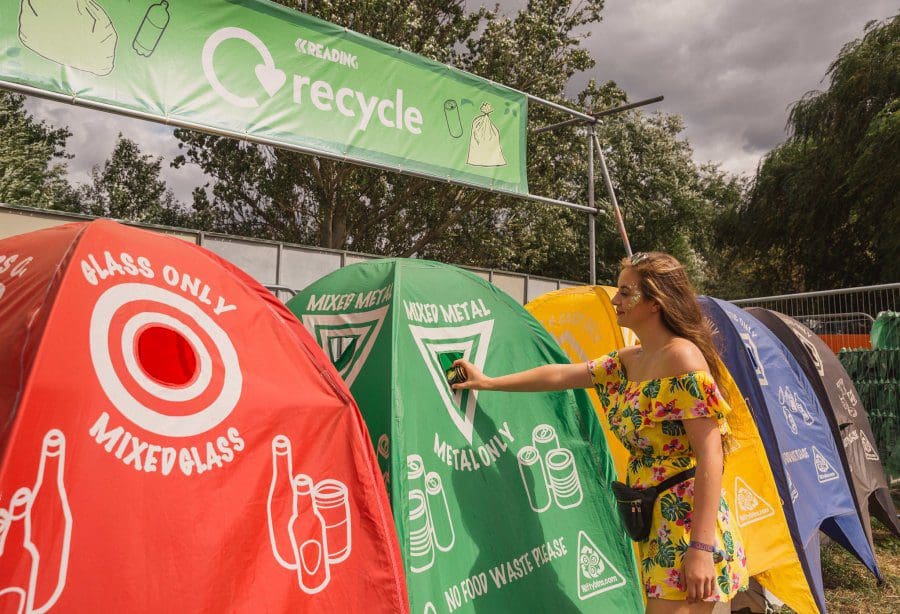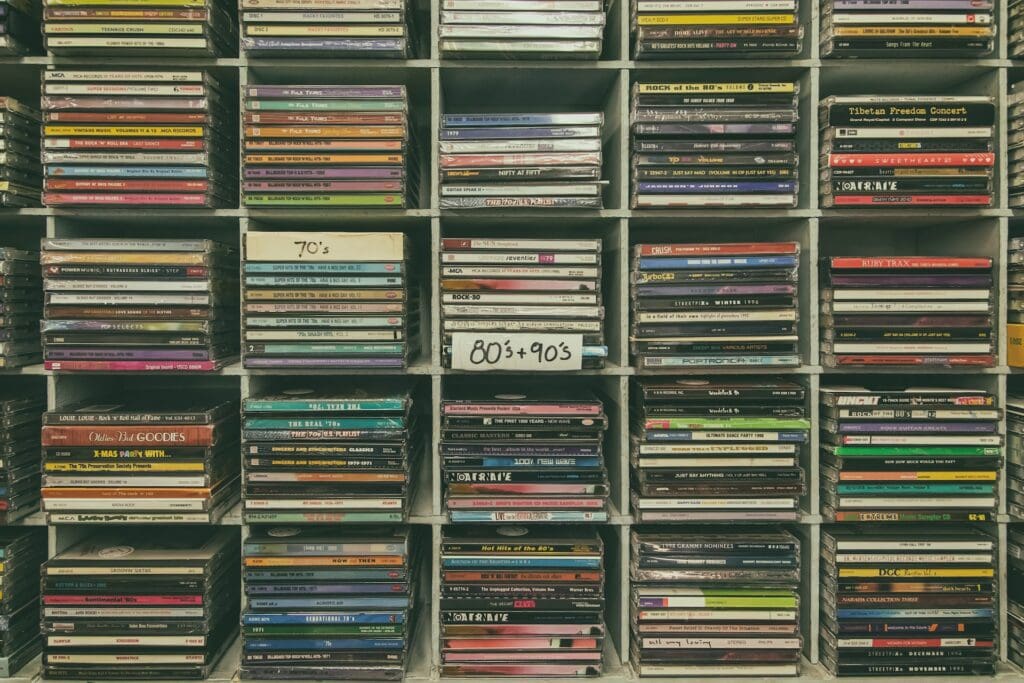The music industry has long been associated with excess and waste. In recent years, a growing number of artists and industry professionals are taking steps to make the industry more eco-friendly. From reducing the carbon footprint of live performances to incorporating recycled materials into merchandise. There are many ways the music industry is embracing green initiatives and making a positive impact on the environment.
In this article, we’ll explore how the music industry is becoming more eco-friendly and the various ways artists and industry professionals are leading the charge.
CDS to Digital Streaming Platforms (DSPs)
Moving from CDs and records to music streaming platforms has been better for the environment in a number of ways. First, streaming music eliminates the need for physical copies of music, which require resources to produce and transport. This reduces the amount of energy and resources needed to bring music to consumers making it eco-friendly.
Additionally, streaming music eliminates the need for CDs to be thrown away after being used, resulting in less waste. Finally, streaming music reduces the amount of energy used to store and access music, as the music is stored and accessed digitally.
Are Vinyl Records Eco-Friendly?
Buying vinyl records does not require any additional energy to produce or transport. Vinyl records are made of durable, recyclable material, and they can be reused and repurposed in a variety of ways. Additionally, vinyl records don’t require batteries or electricity to play, meaning they don’t produce any additional emissions or waste.
Artists that are Making a Change and Becoming More Eco-Friendly

Sustainability has been gaining traction in recent years, as evidenced by the actions of many world-famous artists and bands. These influential figures have made a point to show their fans that being eco-friendly is important. Making an impact goes far beyond words.
Coldplay
In 2019, Coldplay released their album ‘Everyday Life’, and Chris Martin declared that they would not be touring for it. He went on to explain, the band was aiming to create a tour that was sustainable. Martin mentioned wanting to reduce single-use plastic at shows, as well as making them largely solar-powered.
Massive Attack
Massive Attack has joined forces with the Tyndall Centre, which is a research group that consists of natural scientists and economists. They strive to create impactful and policy-relevant interdisciplinary studies.
The collaboration will involve examining the sources of carbon emissions from their touring activities. Subsequently, they plan to develop a framework based on the data collected from travel and production, audience transportation and venue impacts.
Jones further noted “It’s more efficient to have a sustained process of emissions reductions across the sector rather than for individual artists to give up live performances. This will likely require a significant shift in how things are done currently; involving not only the band but also other aspects of business operations as well as audience members.”
Billie Eilish
Billie Eilish, the beloved pop star of the younger generation, is making her upcoming tour a green one. She has decided to ban plastic straws and encourages fans to bring refillable water bottles. She also wants to create a special zone dedicated to educating them about climate change.
Drake
For his first headline tour, ‘Away From Home’, Drake teamed up with Reverb’s Campus Consciousness Tour to minimize the output of fossil fuels. To do this, they used biodiesel, eco-friendly products, and tents equipped with green technology. They educated students about carbon emissions and encourage eco-friendly consumption.
The Challenge for Smaller Artists and Being Eco-Friendly
The challenge for smaller artists is finding ways to promote their identity, music, and latest records. Touring in local regions can help build momentum, but it has yet to reach its peak. To ensure sustainability and successful outcomes of touring, it is important to focus on eco-friendly gigs. This is especially true for creatives with a large global following.
What is Reverb?
Reverb is an organisation that works to bring people together through the music they love, while also tackling the issues that face us. By partnering with musicians, festivals and venues, Reverb helps to make events more eco-friendly. They also encourage fans to become aware of environmental and social issues. What exactly does it take to organise a conscious concert?
Reverb has been a major supporter of sustainability for many famous artists. They have taken multiple steps to promote sustainability in the music industry. They did this by partnering with non-profit organizations, using bio-fueled tour buses and banning single-use plastics at dedicated eco-friendly venues. In their mission to make the music industry more environmentally friendly and have a net positive effect on the planet, they have accomplished much already.
This includes:
Sourcing local food through the Farm to Stage Program.
Proper waste disposal including recycling and composting.
Donating unused food to local food banks.
Collecting and donating hotel toiletries for use at local shelters.
Hosting the REVERB Action Village where fans join the band in taking action on climate change, addiction and homelessness as well as providing ways for fans to pledge to reduce their footprint.
Additionally, Reverb has greened over 250 tours, supported over 4000 not-for-profits, promoted over 950 000 gallons of biodiesel for touring fleets and helped reduce 120 000 tons of carbon dioxide.
The concept of ‘slow touring’ has recently emerged as a response to the increased scrutiny of artist travel. This approach involves spending more time in each location. Taking advantage of the opportunity to become more immersed in the local culture. It emphasizes residency opportunities and makes the journey itself an integral part of the tour. Rather than simply rushing from one place to another.
Festivals being Eco-Friendly
Festivals are a great way to escape reality and enjoy the company of your favourite DJs, artists, and creatives. While performers may be the main draw for booking tickets, how motivated are you to attend if they don’t have initiatives in place such as recycling or waste sorting schemes or upcycled staging?
Burning Man is an example of a festival that takes place while the planet is literally burning, so it’s important to be responsible attendees – like not leaving behind tents after one weekend. The Association of Independent Festivals estimates that over 250,000 tents get left behind at UK festivals each year. This amount of plastic is equivalent to 8,750 straws or 250-pint cups!
The NGO A Greener Festival works with festival organisers through their consultancy and research practices to help them consider key aspects of sustainability. These include the local ecosystem, the impact on the local area, travel and transport, power and electricity usage, procurement methods, solid waste management and recycling processes, water usage and wastewater treatment systems as well as legal compliance protocols.
Additionally, they also focus on behavioural change initiatives in order to promote green artist riders such as reducing single-use plastics consumption or sourcing food with low environmental impact but high social benefit. CO2 analysis is also an important part of their work in order to reduce emissions and ultimately eliminate waste.
Green Man Festival
Organizers of the festival, located beneath the beautiful Brecon Beacons, are dedicated to preserving it. Attendees are encouraged to bring only biodegradable items such as tent pegs and glitter, and single-use plastics are not allowed; instead, reusable drinking containers should be used. After the festival is over, any unused camping items will be donated to refugees around the world so that nothing goes to waste.
Splendour In The Grass
Those looking to reduce their carbon footprint while attending the Australian festival can opt for the ‘Carbon Offset’ ticket option. All of the money raised goes directly into renewable energy projects in the country. For those who want to go a step further, Camp Zero Footprint offers an opportunity to camp with reusable equipment and participate in tree-planting sessions each morning. The winner of this challenge will be rewarded with VIP tickets for next year’s festival!
Latitude Festival
Latitude Festival, one of the UK’s most flamboyant and creative events, is committed to environmental sustainability. In partnership with Julie’s Bicycle, a nonprofit organization that seeks to reduce emissions within the creative industries, Latitude has pledged to reduce diesel consumption and waste by 50% by 2025 as part of its Festival Vision 2025 initiative. This commitment will ensure that festivals have an eco-friendly future.
Leeds Festival
Leeds Festival is renowned for its rock music, but it also offers a wide variety of genres including house, drum and bass, metal, techno, grime and more. Every year the UK-based event presents an impressive lineup of the best rock and pop acts.
Leeds Festival has come up with a scheme where if festival goers collect 10 cups and bottles, they earn £1. If you can fill 1 full recycling bag, they would get £5.
By returning 250,000 plastic bottles and cups in 2017, it contributed to reducing the 12.7 million tonnes of plastic that enter the ocean every year.
Summary
The potential of the entertainment industry to facilitate sustainable growth among fans, venues, creatives and brands is immense. With the advancement of digital technology, musicians and sound streaming services have the ability to become more energy efficient and find new methods for sharing tracks.
To support these initiatives, it is important to make offsetting schemes available for artists and attendees as well as incorporate ideas such as using ticket sales to fund forestation efforts or other social impact projects.





















